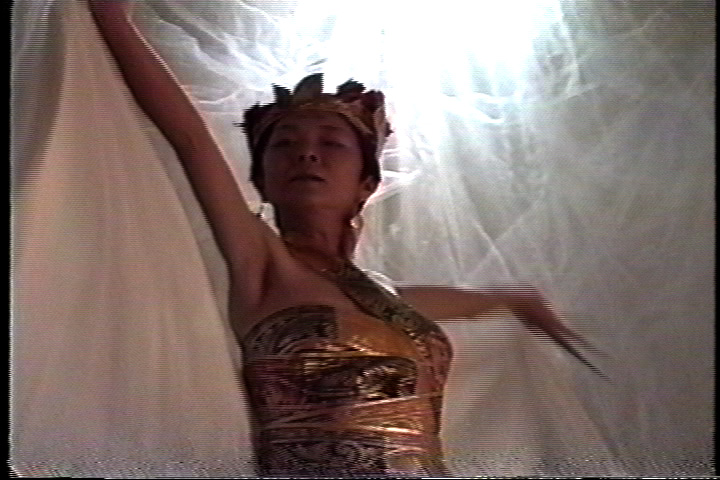from the performance piece
Facts
In 1949, Iva Toguri, a second-generation Japanese-American from Los Angeles, was convicted of treason for broadcasting Japanese propaganda via shortwave radio as "Tokyo Rose" during World War II.
To this day, "Tokyo Rose" evokes for many an Anna May Wong doing a dragon lady. Still more don't even know that Tokyo Rose was an American. And a loyal one -- stranded in Japan at the outbreak of the war, she resisted the pressure to abandon her U.S. citizenship; it was her unusual frankness with her convictions that endeared her to the group of POWs assigned to propaganda broadcasting at Radio Tokyo.
Promoted from her survival job as a typist to an announcer, Toguri and the POWs did their best to twist the program into upbeat humor. She never used the name "Tokyo Rose" on the air. The recordings presented as evidences at her trial included frequent mix-ups with other programs coming from other Japan-occupied territories. Above all, she never wrote the scripts herself.
The American government needed a justification for executive order 9066 of 1942, the internment of Japanese-Americans -- that there were indeed traitors among them. And "traitor" was the word the government wanted heard in the mounting paranoia and anxiety against Communism. In fact, the legendary radio siren Tokyo Rose existed only in the wet dreams of armed men in the South Pacific.
"Intermission"
Incidents reported to the General Headquarters of the Occupation, including sexual assaults, involving American GIs in occupied Japan (August 30 - Spetember 10, 1945) in Kanagawa prefecture alone:
| August 30 | 315 | August 31 | 228 | September 1 | 199 | September 2 | 221 | September 3 | 122 | September 4 | 59 | September 5 | 42 | September 6 | 37 | September 7 | 22 | September 8 | 32 | September 9 | 28 | September 10 | 22 | Total | 1,327 |
1946 sexual assaults by GIs in Tokyo and Kanagawa:
| March: | 15 | (10 attempts) |
| April: | 15 | (20 attempts) |
| May: | 35 | (30 attempts) |
| June: | 30 | (30 attempts) |
| July: | 20 | (20 attempts) |
| August: | 30 | (30 attempts) |
| September: | 20 | (25 attempts) |
One Marine raped a 16 year-old girl in Okinawa; although witnessed by two other Marines, he was merely removed from service without pension.
As for three GIs who murdered two Japanese civilians in Tokyo, their death sentences were reduced at the request of the Veterans of Foreign Wars, which cited: "Greater atrocities committed by the Japanese."1
The same logic was still in frequent use in the 1990s -- justifying Atomic Bombs by Pearl Harbobr. The problem as I see it is that Pearl Harbor was a military target, while Hiroshima and Nagasaki were civilian targets. (RO)
Sirens
The Morgenthau Plan was devised for the postwar treatment of Germany by Henry Morgenthau, Secretary of the Treasury. Germany was to become a preindustrial society, divided among its conquerors, left in the rubble of the war, and denied aid. Given the size of its population, this could only be accomplished by starvation, disease and chaos. The Plan surfaced in planning for Japan in document JCS 1380/15, prepared for the Joint Chiefs of Staff by the Army's Civilian Affairs Division. A permanent solution to the Japanese problem was needed. 2
Pieta Vomitus
(After George Bush Sr. collapsed in the lap of Japanese Prime Minister Kiichi Miyazawa, bushu-ru entered the vocabulary of trendy Japanese youths, meaning "to throw up.")
Stripes
February 1942: Executive Order 9066.
Number of internees among "enemy aliens":
Japanese-Americans: 120,000
(43% of total number in the U.S.)
German- and Italian-Americans combined:
4,300
(0.015% of U.S. total)
"While in Sugamo Prison, Iva learned what had happened to her family. Her mother Fumi had died in May 1942 at the age of 54 after a few months in the Tulare Assembly Center. In May 1943, exactly a year after her mother had died, Iva had a dream of her mother's death."
"Girl, I'm proud of you. A tiger can't change his stripes, but a person can so easily." - Jun Toguri (Iva's father)3
IDFF
In 1895, Kaiser Wilhelm had a dream of Oriental Hordes overwhelming Europe. He made a sketch and circulated copies among royal relatives in Europe. The caption read: Die Gelbe Gefahr (Yellow Peril). 4







